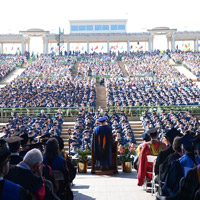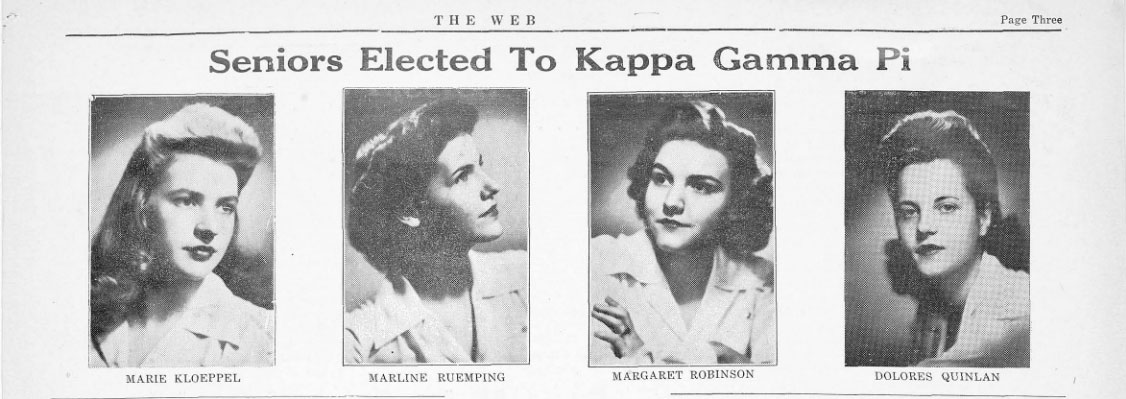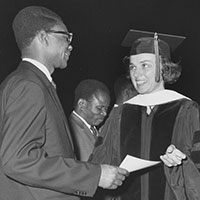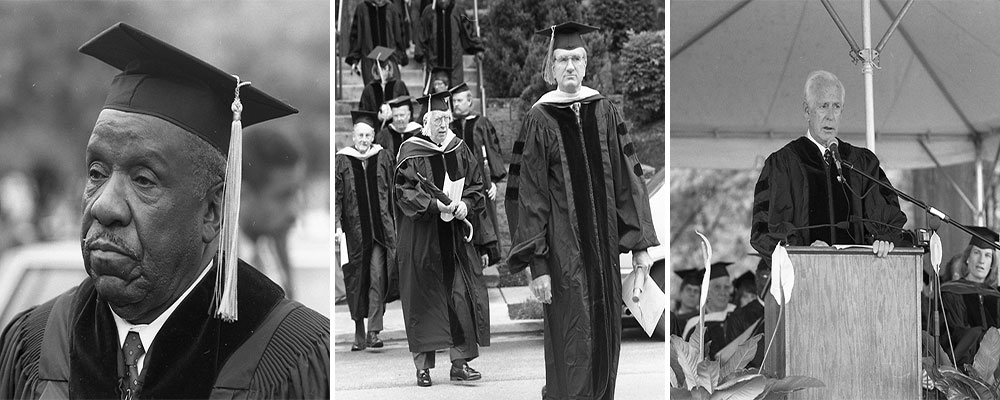Commencement Ceremonies Through History: 25th, 50th, 75th
May 10, 2019

When you've been around for more than 100 years, you've been a lot of places. Over the past 100 graduating classes, Webster University has celebrated its annual Commencement at several locations around St. Louis, where it was founded in 1915.
These locations include the campus itself in Webster Groves, as well as neighboring Eden Seminary and Nerinx Hall — like Webster, also founded by the Sisters of Loretto. Downtown St. Louis locations have included the Kiel Opera House, Powell Symphony Hall, the St. Louis Arena and the Dome at America's Center.
Now, as Webster prepares to celebrate its 100th Commencement ceremony on Saturday, May 11, at the Muny in Forest Park (home to every ceremony since 2009), here is a look back at some past milestone commencement ceremonies: the 25th, 50th and 75th.
1944
The 25th commencement took place in 1944 — months before the end of World War II. The ceremony was held on the main campus grounds in Webster Groves, as was usually the case during the early commencement ceremonies. Clarence Manion, dean of the University of Notre Dame Law School, was named the commencement speaker.
A tradition of early Webster commencement ceremonies was the reading of the ivy poem. A student was selected to write a poem to commemorate the event, a prestigious honor, which would be read at the commencement ceremony and featured in The Lorettine: a student-run publication that was printed four times during the academic school year. As the poem was read at the ceremony, ivy would be planted alongside Webster Hall.
Helen Hagen, assistant editor of The Lorettine and graduate of 1944, was selected to write the ivy poem. Hagen was just one of the 57 graduates of the Class of 1944.

Hagen went on to receive her MA in 1982 and also funded The Helen A. Hagen and Allison Webb Endowed Music Scholarship: “As a 1944 graduate of the small woman’s college Webster was then,” Hagen stated. “I became a voice from the bleachers cheering the choices and changes that developed the ever-reaching goals that made Webster University a place where individual life goals are refined and long-term dreams are nurtured.”
1969
May 17, 1969, marked the 50th Webster commencement ceremony. 401 graduates joined the alumni network, which at that point had reached over 5,000.
Beginning at 11 a.m., the ceremony took place in the Loretto-Hilton Center beginning with the Baccalaureate service (for many years, the main commencement ceremony was preceded by a Baccalaureate ceremony which was more religious in nature).

Jacqueline Grennan-Wexler, president of what was formerly known as Webster College from 1964-1969, opened the ceremony by introducing the commencement speaker, Mrs. Philip A. Hart. Among her numerous accomplishments, Mrs. Hart earned her pilot license during World War II and became the first licensed female helicopter pilot in Michigan.
“I submit that a change of direction is not only an immediately attainable goal,” Hart spoke. “It is an acutely imperative goal. I suggest that to fail to change the direction away from racism, poverty and war is to admit that we are no longer in control of the systems.”
1994
In 1994, the University saw major renovations under the direction of Webster’s acting president, William J. Duggan. In this milestone year, Webster introduced the College of Fine Arts (later to be named Leigh Gerdine College of Fine Arts) by the Board of Trustees to include the departments of Art, Music, and Theatre and Dance. Peter Sargent, who is retiring this year, was the founding dean of the College of Fine Arts.
On May 7, 1994, the 75th commencement ceremony took place on the Eden Seminary grounds and was opened with welcoming remarks from Duggan. In this milestone year, over 4,000 students were part of the graduating class.
Richard A. Liddy, Chairman of the Board, introduced the commencement speaker, Jack Buck, renowned sports director of KMOX/CBS Radio. Buck would also be a recipient of an honorary degree, a tradition that Webster made annual in 1983.
Other honorary degrees were awarded to:
- James Barnes, Missouri State Representative – Webster Alumnus, Doctor of Laws (awarded in Kansas City)
- Swanee Hunt, Ambassador to Vienna, Doctor of Humane Letters (awarded in Vienna)
- Martin Mathews, executive director of Mathews-Dickey Boys’ Club, Doctor of Humane Letters
- Sr. Mary Jean Ryan, executive director of SSM Health Systems, Director of Humane Letters

Through the years, Webster has seen a number of changes: Class sizes have grown, commencement locations have shuffled, and extended campus’ have been added.
Following the 100th commencement, the number of alumni will reach over 200,000 strong with the addition of 5,000 graduates from the Class of 2019.
